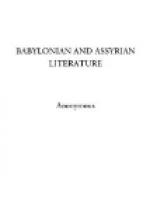“Heabani’s wisdom
chant and sing
To Erech’s
king our mighty Sar.[2]
When Hea did Heabani bring,
Who now to Erech
comes afar,
He taught him then all hidden
things
Of Ki[3] or bright
Samu[4] above,
That to the Mu-di[5] mystery
brings.
Oh, how Heabani
we shall love!”
Chorus
“Then sing with joy
ye Khau-ik-i![6]
The Khau-ga[7]
chant with waving arms,
The Nin-uit[8] sing Au-un-na-ci[9]
Give to our Sar
your sweetest charms.
“All knowledge that
is visible
Heabani holds
it in his glance,
Sees visions inconceivable,
The Zi[10] his
wizard eyes entrance.
Sweet peace he brings from
troubled dreams,
He comes to El-li-tar-du-si,[11]
From a far road by mountain
streams;
Then sing with
joy ye Khau-ik-i!
Chorus
“Then sing with joy
ye Khau-ik-i!
The Khau-ga chant
with waving arms,
The Nin-uit sing An-un-na-ci!
Give to our Sar
your sweetest charms.
“E’en all that
on the tablet rests,
In Erech’s
tower, the Su-bu-ri,[12]
The beautiful, with glorious
crests,
He wrote for far
posterity.
We plead with him to leave
us not,
But Zi-Gab-ri[13]
him led away,
When our great Shal-man[14]
joy us brought,
And Elam fled
to the blue sea.
Chorus
“Then sing with joy
ye Khau-ik-i!
Il-gi-sa-kis-sat[15]
from above,
The Nin-uit sing An-un-na-ci!
Oh, how Heabani
we shall love!”
The maidens note their monarch’s moody face,
And turn their songs to him with easy grace,
Of their great ruler tune a joyous lay,
And oft into his eyes hurl glances gay;
And trumpets join the chorus, rolling drums,
And wild applause from all the chieftains comes,
Till the grave seers and councillors now cry
In praise of him they love so tenderly:
With arms upraised the mighty chorus join,
Until his heart is filled with joy divine;
And thus they sing with more than royal praise,
Their love for him in every face doth blaze.
[Footnote 1: “Sar-dan-nu,” the great King.]
[Footnote 2: “Sar,” king.]
[Footnote 3: “Ki,” earth.]
[Footnote 4: “Samu,” heaven.]
[Footnote 5: “Mu-di,” seers or wise men.]
[Footnote 6: “Khau-ik-i,” the choral band.]
[Footnote 7: “Khau-ga,” chorus.]
[Footnote 8: “Nin-uit,” song.]
[Footnote 9: “An-un-na-ci,” spirits of the earth.]
[Footnote 10: “Zi,” spirits of the earth, air, water, etc.]
[Footnote 11: “El-li-tar-du-si,” one of the temples of Erech.]
[Footnote 12: “Su-bu-ri,” the lofty.]
[Footnote 13: “Zi-Gab-ri,” spirits of the mountains.]




